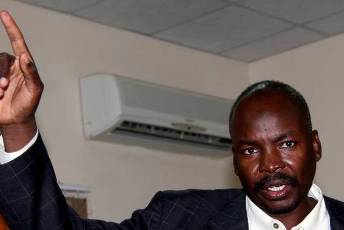Sudan says US involved in Juba’s support to rebels
March 2, 2012 (KHARTOUM) – Sudan has accused the United States (US) of being involved in the support allegedly provided by neighbouring South Sudan to rebels fighting the Khartoum-based government.

Haroun’s accusation, which he made during an interview with Sudan state radio on Friday, come after the US Secretary of State Hillary Clinton accused Khartoum and Sudan’s President Omer Al-Bashir on Wednesday of exerting a “steady effort” to undermine the independence of South Sudan.
Clinton also warned that her country is prepared to increase pressure on Khartoum and Bashir personally if their alleged effort continues.
South Sudan seceded from Sudan and formed an independent state in July last year as a result of the US brokered Comprehensive Peace Agreement (CPA) which was signed in 2005 to end more than two decades of north-south civil war in Sudan.
However, relations between the two neighbours remain tense over a number of post-secession issues including oil, borders, citizenship, national debt, Abyei, water and international agreements.
Most recently, landlocked South Sudan decided to suspend its oil production in retaliation to Khartoum’s confiscation of the crude pumped into pipelines that run through the north’s territory to Port Sudan. Sudan defended its move by saying that this is a form of payment for what it claims are outstanding invoices.
Sudan also accuses South Sudan of supporting rebel fighters of the Sudan People’s Liberation Movement – North (SPLM-N) which fought as part of its army during the war and later joined three rebel groups from Sudan’s western region of Darfur to form the SRF in November last year.
South Kordofan’s governor also criticised Clinton’s allegation that Khartoum was seeking undermine Juba’s government, echoing scepticism towards Washington’s integrity.
“The US is not an impartial or credible interlocutor. There is no hope of anything good coming out of it,” he said.
Sudanese officials allege that Washington is conspiring with Juba to overthrow the Khartoum government in the view that it is not willing to reach an agreement with South Sudan on post-secession issues, especially the hotly contested region of Abyei.
Washington has been spearheading a diplomatic campaign to persuade Khartoum to allow international aid groups to operate in South Kordofan and Blue Nile. But the Sudanese government continues to oppose the move, citing security concerns and accusing the US of seeking to feed the rebels.
Haroun admitted that the war in South Kordofan had created a humanitarian crisis, in contrast with the announced findings of a recent government survey which said that the humanitarian situation in the state was “normal”.
“No war produces prosperity or development but rather humanitarian consequences that we don’t deny they exist, especially in SPLM-N controlled areas,” he said.
However, he later charged that the true goal of the rebellion in his state is to create a humanitarian situation allowing international aid groups to feed the rebels and thus prolong the war. He went on to stress that no international aid organisation would be allowed to operate in South Kordofan.
“No Khawaja [Westerners] will come to work from Save the Children or Care [in South Kordofan] as long as we are alive,” the governor declared, adding that the agendas of international aid groups are not humanitarian at all.
The United Nations (UN) estimates that 417,000 people have been displaced since the South Kordofan conflict erupted in June last year and later spread to Blue Nile. UN officials say that food insecurity and malnutrition have reached “alarming levels” in rebel-controlled areas.
Turning to the security situation in his state, Haroun reiterated accusations that South Sudan had participated in the attack launched by SRF forces on Jau area last week. He claimed that South Sudan’s army, the Sudan People’s Liberation Army (SPLA), had invested a great deal of military hardware in the assault.
South Sudan denied participation in the SRF attack on Jau which lies on the disputed border areas between the two countries. However, Haroun claimed that Sudan’s army (SAF) had obtained ID cards belonging to the SPLA officers who participated in the attack.
“They are not so smart to cover their hallmarks” he said.
Haroun said that SAF was still conducting military operations in the area and are continuing to contain the impact of Jau attack.
The governor also said that SRF forces had set up a base in a farm land owned by the governor South Sudan’s neighbouring state of Unity, Taban Deng, who, according to Haroun, is now working full time as a supply officer to the rebels.
Haroun said that Khartoum was now in a state of self defence and is considering all the options. “Our options are open. We are not happy with war but we are now fighting a defensive war,” he stated.
South Kordofan’s governor is one of four individuals, including president Al-Bashir, who are wanted by the International Criminal Court (ICC) on charges of masterminding atrocities committed during the zenith of the conflict in Sudan’s western region of Darfur.
(ST)
